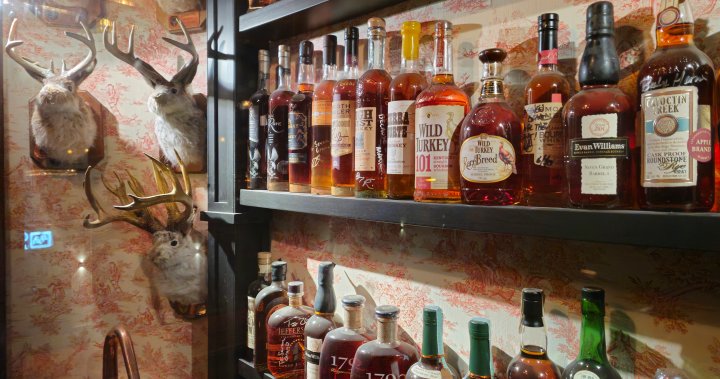The specter of a trade war between Canada and the United States looms, threatening to disrupt the flow of American alcohol across the border and impact Canadian consumers. President Trump’s potential tariffs on Canadian goods have prompted Prime Minister Trudeau to pledge retaliatory measures, with American alcoholic beverages emerging as a prime target. This potential trade skirmish would significantly affect the hundreds of millions of dollars Canadians spend annually on American booze, particularly the popular American whiskey market, worth over C$100 million. Experts predict a variety of consequences for consumers, producers, and the market as a whole, from shifting consumption patterns to the potential for domestic industries to flourish.
The impact on Canadian consumers hinges on the elasticity of demand for American alcohol. While some loyalists may continue purchasing their preferred beverages despite price increases, others may switch to alternatives. This scenario played out six years ago during a trade dispute between the US and the EU, resulting in a significant decline in American whiskey exports to Europe after the EU imposed steep tariffs. Economists predict similar behavior among Canadian consumers, particularly for spirits, while beer consumption might be less affected. The degree of impact also depends on drinking habits, with heavy drinkers more likely to reduce consumption, while occasional drinkers may absorb the higher costs. Further complicating the matter is the potential removal of American alcohol from shelves in Ontario, a move initiated by Premier Doug Ford to promote domestic products. This action underscores the power of provincial control over alcohol sales in shaping consumer choices.
The potential trade war presents a mixed bag for the Canadian alcohol industry. While the absence of American competition could boost sales of Canadian whisky, wine, and beer, there’s also the possibility of consumers switching to non-alcoholic beverages or reducing overall consumption. Canadian whisky producers, in particular, could see a resurgence in popularity, harkening back to historical periods like the American Civil War and Prohibition when Canadian whisky filled the void in American supply. Canadian whisky enthusiasts emphasize the quality and variety of domestic offerings, suggesting consumers have ample options to explore. The wine industry also stands to gain, with experts pointing to flourishing domestic regions like Niagara Falls and British Columbia as viable alternatives to Californian wines. Furthermore, the burgeoning Canadian craft beer scene is already challenging American imports in many markets. This trade dispute presents an opportunity for Canadian producers to capture a greater market share and showcase the diversity and quality of their products.
The proposed tariffs raise concerns about the potential economic damage to both countries. While forgoing Kentucky bourbon or Tennessee whiskey might seem a minor inconvenience for individual consumers, the broader economic implications of a trade war are far more serious. The disruption to established trade flows, the uncertainty for businesses, and the potential for retaliatory measures to escalate create a risky scenario for both economies. The situation also underscores Canada’s dependence on the US market and the importance of diversifying trade partnerships. The current threat compels Canada to explore alternative markets and reduce reliance on a single, potentially volatile partner.
Beyond the economic considerations, the potential trade dispute also highlights the intricate interplay between consumer preferences, product availability, and government policies. The Ontario government’s move to remove American alcohol from shelves exemplifies the powerful influence of provincial control over alcohol sales. This action, coupled with potential price increases due to tariffs, could significantly alter consumer behavior and create opportunities for domestic producers. However, the success of such initiatives relies on consumer acceptance of domestic alternatives and the ability of Canadian producers to meet increased demand. The evolving landscape will require strategic adjustments from both producers and retailers to capitalize on the changing market dynamics.
Finally, the focus on alcoholic beverages underscores the sometimes unexpected consequences of trade disputes. While the broader economic impacts are significant, the potential disruption to the enjoyment of a favorite drink brings the issue closer to home for many consumers. From the connoisseur savoring a glass of Kentucky bourbon to the casual beer drinker enjoying a weekend barbecue, the potential trade war could alter drinking habits and force consumers to explore new options. The situation also highlights the resourcefulness of consumers and producers, with suggested alternatives ranging from Canadian rye whisky in cocktails to exploring the world of non-alcoholic beverages and mocktails. The evolving landscape may lead to the discovery of new favorites and a deeper appreciation for the diverse options available.

